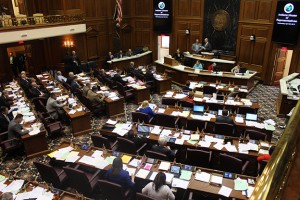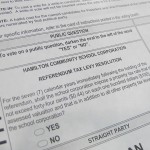Testing, Data Dominate Summer Study Committees’ Education Agendas
The 2015 “education session” may be over, but Indiana legislators still have some school-related work to finish.

The Indiana House of Representatives meets on the last day of the 2015 session. (Photo Credit: Rachel Morello/StateImpact Indiana)
A number of legislative study committees will meet over the summer break to discuss topics that lawmakers decided during session need further investigation.
What’s on their plate this go-around? State testing requirements, preschool special education services, school corporations’ data reporting requirements and property taxes.
Following up on discussions of Senate Bill 566, the Interim Study Committee on Education will consider whether Indiana should replace the statewide ISTEP+ standardized testing program with an alternative assessment.
This continues years of debate, both in Indiana and on the national scale, over standardized testing. To comply with federal mandate, Indiana education officials have been developing multiple updated versions of the ISTEP+ over the last few years to match new state standards adopted after Gov. Mike Pence pulled out of the Common Core in 2014 – and it has been anything but smooth sailing.
Pair new tests with new technology, and you encounter a lot of issues. Following drama with current test vendor CTB-McGraw Hill, Indiana switched to British testing company Pearson – which has its own history of problems – to develop the 2015-16 test.
Sen. Luke Kenley, who authored SB 566, says using a national assessment would save money and eliminate all the hubbub of creating and administering a state-specific test. Whether those claims are true will be one of the main questions the study committee faces.
That group will also take a look at the impact of data reporting requirements imposed on schools. Both the state and federal government require local districts to file reports on a variety of topics including test scores, enrollment, attendance, graduations and much more each year – and some say the impact on districts can be stressful.
Among the committee members studying this particular issue is Lee Ann Kwiatkowski, a new member of the restructured State Board of Education, who was elected by her fellow board members to join the conversation.
A third umbrella item on the education committee’s agenda involves topics concerning special education, with an emphasis on funding in the preschool years.
School issues will also be addressed in the Interim Study Committee on Fiscal Policy, which plans to examine whether to amend state statute regarding the school capital projects fund to allow money to be used for utilities, insurance and technology.
You’ll remember that because of property tax reform adopted in 2008, school districts can levy additional money for capital projects and construction through referenda on their local ballots. Under the state’s current administrative code, use of those funds is restricted to building acquisition, repairs and upgrades, as well as “equipment” – defined as “a mobile or fixed unit of furniture or furnishings, a machine, an apparatus, an article, or a set of articles.”
Code also specifically prohibits schools from using funds for any projects involving interscholastic or extracurricular activity.

